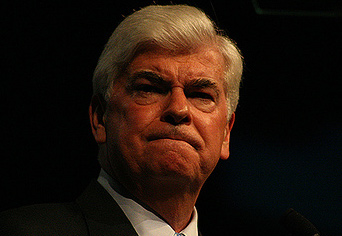 Richard Blumenthal | Flickr/kellynigro (Creative Commons).Ezra Klein says I’m wrong to argue that Richard Blumenthal stands a good chance of eventually becoming a better senator than Chris Dodd:
Richard Blumenthal | Flickr/kellynigro (Creative Commons).Ezra Klein says I’m wrong to argue that Richard Blumenthal stands a good chance of eventually becoming a better senator than Chris Dodd:
Legislating isn’t just a question of purity and ideas. It is, at least in large part, a question of being good at the work of legislating: knowing parliamentary procedure, understanding the legislative process, sensing where your leverage is on a bill, building long relationships with other lawmakers so they’ll be open to your interventions, etc, etc. Dodd, as one of the longer-serving members of the body, was also among the best at that work: There’s a reason Ted Kennedy asked him to quarterback the HELP Committee’s health reform bill after Kennedy fell ill. And there’s a reason Dodd managed to pass it quickly and smoothly out of his committee.
Blumenthal might be less compromised than Dodd, but it will be a long time before he’s got Dodd’s legislative chops. And that’s not a criticism of Blumenthal: He’s been getting very good at being attorney general during the years when Dodd was getting very good at being senator. We tend to think about elections in terms of candidates rather than jobs, but in every other sphere of life, we tend to think of candidates in terms of the jobs they’ll be filling, and that’s probably the better way to do it.
Dodd may be a great “quarterback,” but I suspect the Health committee’s political makeup (more liberal and fewer conservative Democrats than the Finance committee) was far more important to getting the bill passed quickly. Moreover, there are plenty of senators who are great at understanding the legislative process and sensing where their leverage is on a bill. Not all of them use that leverage for good. Joe Lieberman, who was able to demand the removal of the public option from the health care bill, is one such senator. Point being that liberals don’t simply need senators who understand process. They need senators who understand process and use that understanding to advance liberal goals. You don’t want senators who are effective at doing bad things. The problem is that on the issue he has the most power over—financial reform—Chris Dodd has a problematic record.
Since Dodd has a long record of fighting for liberal causes on a lot of issues, liberals have been quick to defend his ties to Wall Street. That’s too bad, because it obscures the fact that there’s a real difference between Dodd, a five-term senator with clear ties to and dependence on the financial sector and Blumenthal, who made a living suing companies like Countrywide.
The reason that state attorneys general like Blumenthal had to do so much litigating against financial companies in recent years was because Washington wasn’t protecting consumers, the Fed wasn’t doing its job (it’s empowered to protect consumers, it just didn’t), and someone had to step up. This was not just Republicans’ fault, either. It wasn’t just Phil Gramm who was working to deregulate the financial sector in the 1990s and 2000s. Many Democrats, including Dodd, acquiesced to or often joined the bipartisan effort to curtail investor lawsuits, abolish Depression-era banking regulations, and keep derivatives unregulated. (Perhaps bipartisan complicity in the deregulatory orgy of the past two decades is one reason why no one’s really been held accountable for it.) Maybe Blumenthal would have done the same thing if he had been in Dodd’s place in the ’90s. But his real-world record suggests otherwise.
Sure, people can change. Maybe the Great Recession taught Dodd a lesson—some of his current reform proposals suggest he may have altered his Big Finance uber alles ways. (It will be interesting to see what happens to the more populist proposals now that Dodd doesn’t have to worry about getting reelected.) As I said above, Dodd has a long record of good works in many areas—the Family Medical Leave Act comes immediately to mind. But on financial regulation, there’s no way a pro-regulation liberal can prefer Dodd to Blumenthal. Financial regulation is one of the most important issues of our time. The past few years have shown us exactly the kind of damage an underregulated or poorly regulated banking sector can cause. All the root causes of the crisis are still in place. So it’s really important that politicians get this right. Chris Dodd was wrong on it—early and often.











